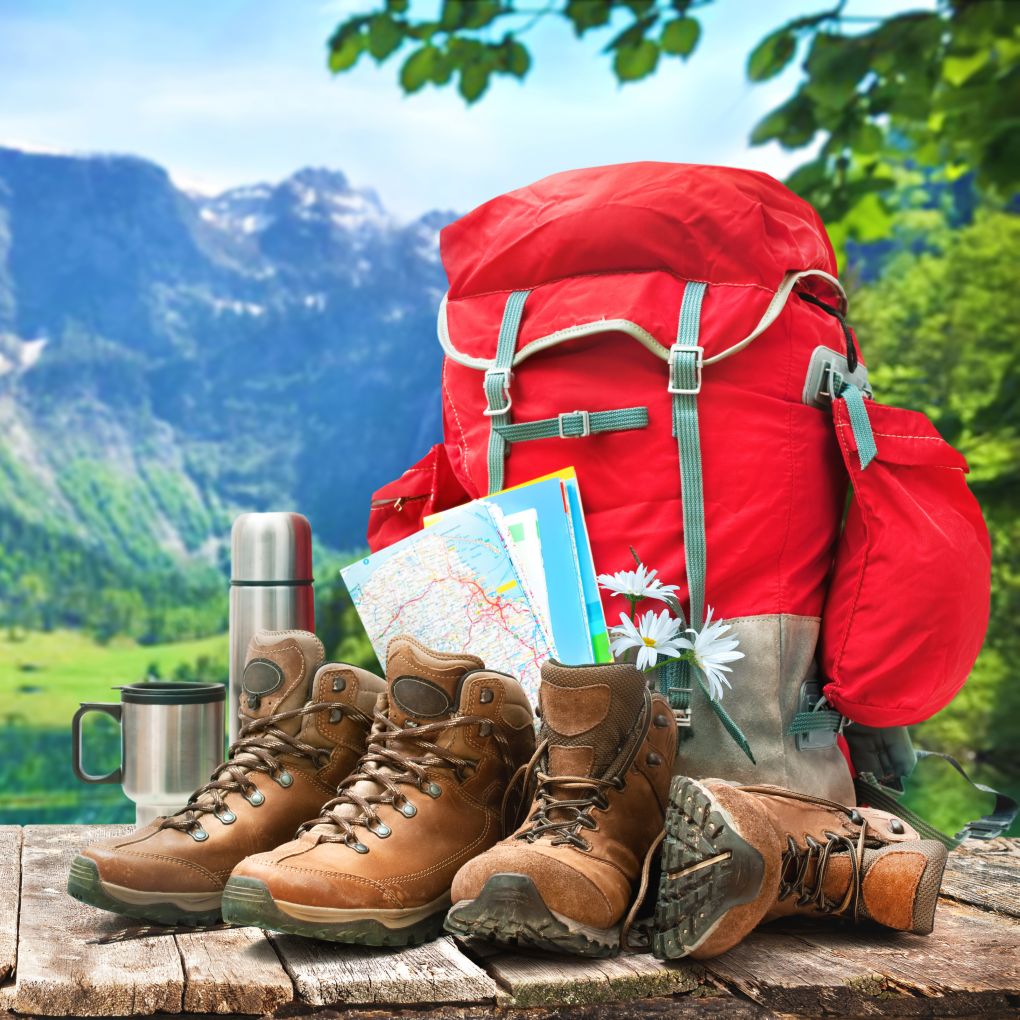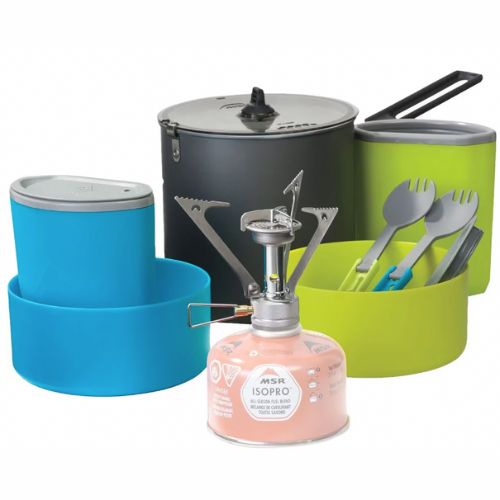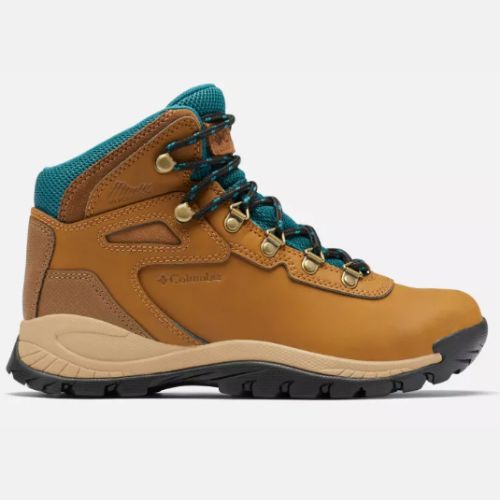Camping is a blast, whether you’re roasting marshmallows with the kids, hiking mountains with friends, or just relaxing with your favorite person while you watch the sun set over a lake.
Unfortunately, camping also takes a bit of planning. (Don’t we wish we could just show up!) If you’re new to camping and not sure where to start, this quick camping guide walks you through everything you need to do to have a relaxing, restorative outdoor break.
Book your campsite close to home
When it comes to choosing the perfect campsite, let’s start with a tip that’ll have you thanking yourself later: camp close to home. This way, you can easily get back if you forget something crucial or the weather takes a turn for the worse. Plus, exploring the hidden gems near your backyard might surprise you! Camping near home lets you create memories without too much fuss. Check out National Parks or KOA campgrounds near you.
Wherever you go, make sure you book your campsite in advance. They can go fast!
Get your gear
If you’ve never been camping before (or not since you went with your family as a kid), then you’re going to have to buy or rent some supplies.
Here’s a checklist of the basic camping gear we recommend for any beginner camper (or for a pro camper looking to refresh some worn-out pieces). If you’re an ID.me member, just click the links to get ID.me discounts or cash back!
Backpack
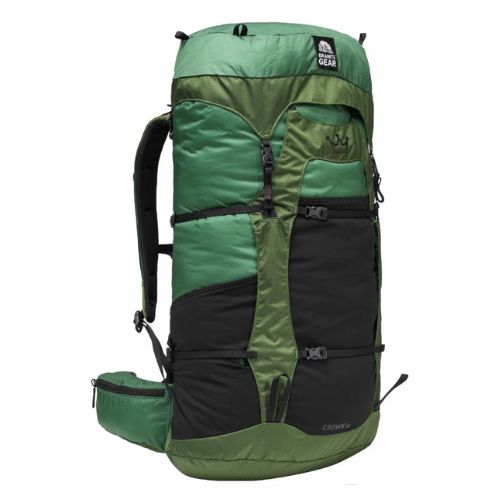
If you’re going to be hiking, your backpack will be your most important piece of equipment. Choose something light, breathable, and durable that can carry plenty of water and supplies.
- Granite Gear Crown 2 60L Backpack | Backcountry
- Crossroads 22 L Commuter Backpack | YETI
Tent
If you’re not sure you’ll love camping, then you may be able to rent a tent for this first trip. But if you’re committed, then investing in a good tent is essential. Choose something with plenty of space. If you’ll be camping during cooler months, make sure your tent is appropriate for the temperature.
- Dagger OSMO Tent: 2-Person 3-Season | Backcountry
Sleeping bags and pads
What’s the quickest way to ruin a camping trip? Get no sleep. If you want to have fun, make sure you have a warm, dry, cozy sleeping arrangement. That means a sleeping bag appropriate for the temperature where you’re camping, a well-insulated sleeping pad that protects you from the cold ground, a camping pillow, and anything else you need to wake up well-rested and ready to explore.
- Stoic Groundwork Single Sleeping Bag | Backcountry
- Stoic Double Cloud Camp Bed | Backcountry
- ALPS Mountaineering Camp Pillow | Backcountry
Cooler
If you’re backpacking, you can’t take a cooler, unfortunately. Stock up on dry food like trail mix, oatmeal, and dehydrated veggies! But if you’re camping near your car or RV, then you can bring along some fresh fruit and milk. Get a nice big cooler (bigger than the one you use for a quick picnic) so you can store all the food you need and plenty of ice.
Water bottles
Nice big water bottles are essential for camping. If you’ll be doing lots of hiking, consider getting a water bladder that you can drink from hands-free.
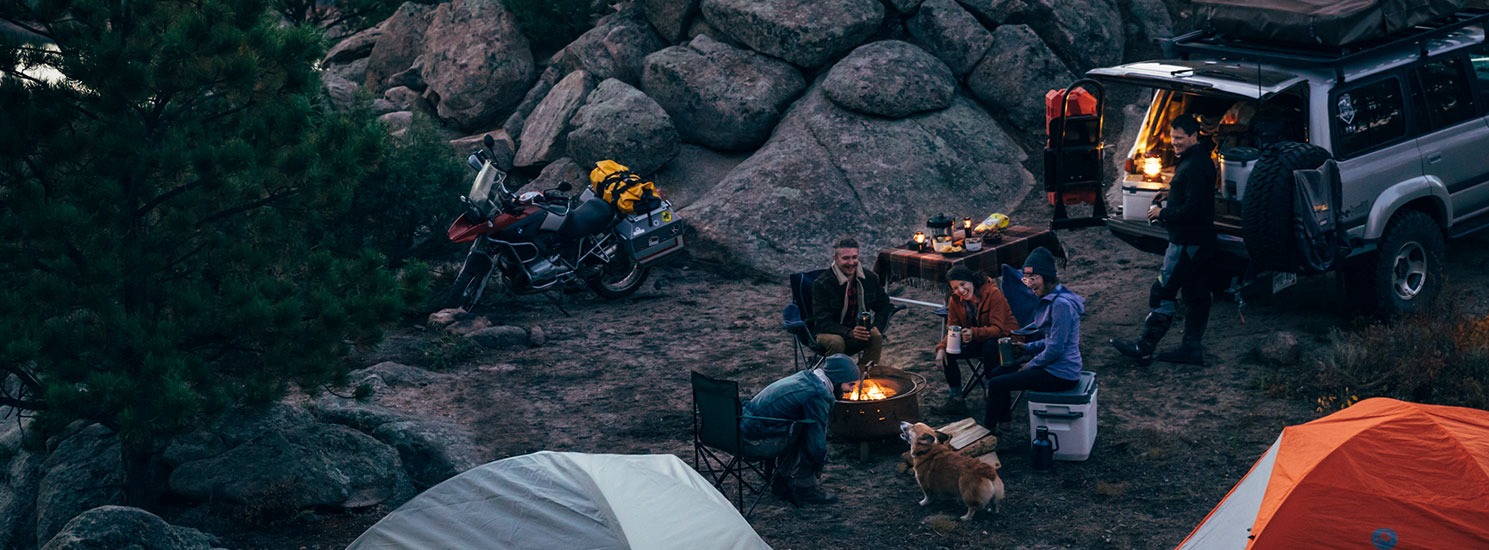
Stanley
Shop travel mugs
Stove
You’ll get sick of GORP pretty fast, so make sure to get a camping stove to make some filling dinners (you’ll be hungry!) and hot coffee. Don’t count on making everything over a fire, because lots of campsites ban fires during the hot months. (Always check before lighting one!)
- MSR PocketRocket Stove Kit | Stanley
- MSR PocketRocket 2 Stove | Stanley
Cookware
Pots, pans, spatulas, forks, knives, spoons… You’ll need all of it. Choose lightweight cookware and utensils that won’t take up too much space. Kits that nest together are a great option.
Camp chair
Chairs are optional, but they can make your camping trip much more comfortable. If you’re backpacking and can’t carry a chair, consider a mat that will insulate you from the ground when you sit.
- Trailhead Camp Chair | YETI
Lighting
It’s smart to bring flashlights, but don’t stop there. Headlamps are great to free up your hands, and lanterns make it much more pleasant to sit outside as it gets dark. Don’t forget to bring extra batteries or a portable charger.
- Black Diamond Spot 350 Headlamp | Backcountry
- Goal Zero Crush Light | Backcountry
Hiking Shoes or Boots
If you’ll be doing lots of hiking, sturdy and comfortable boots are a must. Sore feet and blisters will ruin your trip just as quickly as a bad night’s sleep. If you buy new boots, make sure to wear them a bit first in case they need some breaking in.
- Men’s Newton Ridge™ Plus II Waterproof Hiking Boot | Columbia Sportswear
- Women’s Newton Ridge™ Plus Waterproof Hiking Boot | Columbia Sportswear
Clothes for rain and cold
Come prepared for any weather you might encounter. Even if it’s pretty warm in your area, it will be colder after dark. Bring warm layers and reliable rain gear.
- Crew Neck Sunshirt | YETI
- Men’s PFG Zero Rules™ Ice Hoodie | Columbia Sportswear
- Women’s Arcadia™ II Rain Jacket | Columbia Sportswear
Sunscreen and bug repellant
When you’re packing your usual toiletries, make sure to bring these along too!
Plan your trip
Some of us are natural-born adventurers who love to go with the flow – and that works! Embracing spontaneity can lead to unexpected surprises, and there’s nothing wrong with planning to spend your camping trip just kicking back by the lake.
However, a little bit of preparation can go a long way in ensuring you have a fantastic time. Consider looking up some hiking trails in the area ahead of time or researching outdoor sports you might want to try. Who knows, you might find a breathtaking summit or discover your inner rock-climbing superhero! Don’t forget to pack some games and books for rainy days. They can transform a dreary afternoon into a cozy, laughter-filled gathering.
Camping Tips from Reddit
Experienced campers have offered awesome tips on multiple Reddit threads to help you make the most of your newbie camping experience. We’ve curated some of the best for you!
- Consider purchasing wood closer to your camping location to prevent the spread of pests and insects. Transporting wood can also be illegal in some places.
- Some effective fire starters include cotton balls wiped in petroleum jelly or dryer lint. Remember to start with small kindling and gradually increase the size of the fuel, ensuring the fire gets plenty of oxygen.
- Invest in a good tarp and learn how to pitch it for protection from the elements. Insulate the ground underneath your sleeping bag. Sleeping pads are not just for comfort but also for thermal insulation.
- Bring essentials like towels (preferably microfiber), duct tape, a tarp or two, soap, and hand sanitizer. These can prove extremely useful.
- Be prepared for water-related situations, whether during hiking, at night, or while you’re sleeping. Cold nights and unexpected rain can pose challenges.
- Avoid bringing food or smelly items into the tent to prevent attracting wildlife like raccoons or bears. Lock your cooler in the car to keep it safe from animals.
- Consider a minimalist style of camping, even if you’re car camping, to avoid carrying too much unnecessary equipment.
- Look at State and National Parks for your camping excursion. They’re usually affordable and tended by park rangers who may be able to help if you run into trouble. (Just be warned that these sites can book many months in advance.)
- Learn camping tips from the experts – REI! Videos like How to Build a Fire will help you navigate your first camping experience like a pro.
Enjoy Your Summer Camping!
Pack up your gear, get out there, and enjoy yourself! Organizing a camping trip can be stressful, especially if you’re a beginner or you’re bringing along kids or pets. But remember that the point of all this prep and planning is to have a wonderful time out in nature (which is proven to reduce stress!) If you’ve followed this guide, you have everything you need and a beautiful campsite booked close to home. Drink in that fresh air and have a wonderful time!

